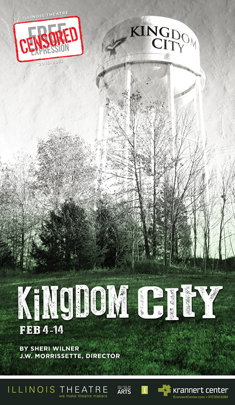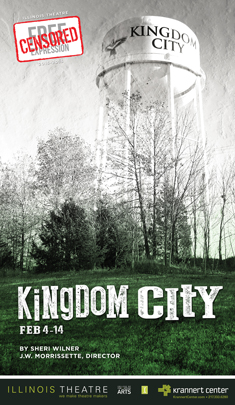I’m going to take a second and ask you to reflect on if you consider yourself someone who enjoys exploring the differences of opinion within our society, whether it’s portrayed in politics, art, or just basic conversation. If the answer was yes, (and also if you just enjoy fabulous theater) then the Krannert Center’s upcoming show Kingdom City by Sheri Wilner is definitely something you’ll want to put on your calendar.
Kingdom City, which is inspired by true events, tells the story of the conservative small town Kingdom City, Missouri, which is plunged into a heated divide over whether or not their high school’s production of The Crucible should be canceled because of its perceived inappropriate content.
In preparation for what promises to be a entertaining and stimulating performance, I spoke with director J. W. Morissette to discuss the play that tells a story all of us have experienced in some fashion; what is appropriate and what goes a little too far, and, most importantly, who gets to decide?
Smile Politely: I was fascinated while reading about Kingdom City, and that it’s actually based on the true events of 2006, when a high school in Fulton, Missouri canceled their performance of The Crucible due to its perceived inappropriate content, sparking major controversy. What do you think is unique about this play, in the sense that it addresses a fairly recent event, and considering the current politically-correct climate?
 J. Morissette: Sheri Wilner, the playwright, manages to present a wonderful climate for looking at each side of the controversy as she frames in this play. She was certainly inspired by the 2006 events, but she also manages to use those events to broaden the exploration of who gets to decide what is right or what is wrong. What is unique about this work is that it puts these opposing forces together in the same space and makes a fascinating case for how each side has a point of view they believe to be right. She doesn’t solve the problem — that would be too easy — instead she manages to challenge the audience to think about how we inhabit a world in which differing parties believe themselves to be right, and yet those parties continue to exist in the same space.
J. Morissette: Sheri Wilner, the playwright, manages to present a wonderful climate for looking at each side of the controversy as she frames in this play. She was certainly inspired by the 2006 events, but she also manages to use those events to broaden the exploration of who gets to decide what is right or what is wrong. What is unique about this work is that it puts these opposing forces together in the same space and makes a fascinating case for how each side has a point of view they believe to be right. She doesn’t solve the problem — that would be too easy — instead she manages to challenge the audience to think about how we inhabit a world in which differing parties believe themselves to be right, and yet those parties continue to exist in the same space.
SP: Do you think it’s important to have shows like Kingdom City that push back against, as well as explore, those tensions and varying differences?
Morissette: It is absolutely necessary to examine underlying tensions in our society. Kingdom City will have audiences full of a wide variety of belief systems and understandings — just like the university community and wider community of Champaign-Urbana. If we can come together at a play like Kingdom City we very well may find paths to seeing those things that unite and divide us, and understanding those we believe to be on the other side of our arguments. There is space in our existence for people to hear each other’s differing points of view and perspectives without being offended. I think that we sometimes forget that. I think we sometimes believe there is an absolute right and wrong. So what happens, then, when two rights, in opposition to each other, exist in a single space? That’s where a society can truly embrace the idea of open communication. That isn’t to imply there never exists an absolute right or wrong but rather a challenge to us to consider all points of view.
 SP: Stemming off of the first question, how as a director have you shaped, or presented the struggle between propriety or, what I would call religious conservatism, versus more modern, socially liberal views within the play?
SP: Stemming off of the first question, how as a director have you shaped, or presented the struggle between propriety or, what I would call religious conservatism, versus more modern, socially liberal views within the play?
Morissette: I have relied on the writing of Sheri Wilner to tell the story. The only individual perspective I’ve allowed into the rehearsal space as a director is the belief that each person on whatever side of the argument believes themselves to be right. We’ve eliminated judgement about if they are right; it doesn’t matter when telling the story, because the truth is they believe themselves to be right. How do you work with actors to achieve the type of performance you, and they, want? At the core of what we do is tell a story based on the given circumstances of the play. We are artists with our own perspectives and beliefs. They may or may not align with the characters we are creating. In order for us to give life to those characters in a non-judgmental way we live in the facts of the play. We also spent a great deal of time openly discussing our own perspectives so we could sort out what was useful to us as we worked and what needed to be set aside.
SP: When did you begin the rehearsal process, and how has that been going?
Morissette: The design team and directorial team started work in September of last year. We actually started rehearsals in December of last year but were only able to meet for 3 days before the university break. The cast and selected crew arrived back a week early from winter break to start rehearsals in earnest in January. All told we will really have three and a half weeks of rehearsal before we get to the final technical rehearsals. These rehearsals have been intense, concentrated, and incredibly enlightening. The actors have been constantly challenging me to keep offering more fuel for their fires. Because of the concentrated time frame we used the days in December to discuss our own thoughts on the work but from the minute we arrived back in January we have been on our feet actively creating the world of Kingdom City.
SP: What sort of challenges, but also high moments have you, the cast, and crew experienced?
Morissette: All of this team, except for me, are students at the university. Perhaps the biggest challenge was that we launched a semester in the middle of our rehearsal process. The work in rehearsal is the reward of what we do; it is sometimes the outside pressures of our everyday functioning that pose the biggest challenges.
SP: You have a lot of experience with casting, acting, directing — almost every aspect of theater and its production. Why did you decide to direct Kingdom City, and do you always gain or learn something new with every show you’re involved in, or are you continually building off of past experiences?
Morissette: I am incredibly excited to have had the chance to work on this show but I was asked to direct it; I didn’t propose to direct it. In fact that was how I was introduced to it. I was asked to consider directing it and I sat down immediately to read it. Upon finishing it I was hooked. I think we are a culmination of our experiences so everything I’ve ever experienced has come into play in creating the show. I’m originally from a small town in Michigan. The challenges in Kingdom City rang absolutely clear to me. It also made me an advocate for the perspectives and environments of a small town. Again — we set out to avoid judgement in telling the story.
SP: How has your extended career helped in directing Kingdom City?
Morissette: I am lucky enough to have had a vast number of experiences over the my years in theatre. The exciting thing about this particular production was that it was the first time in 15 years I was working on such an intimate play. Usually I have casts of 20 to 30 people. This play has six characters. That made for a more intimate rehearsal process with a great deal of time dedicated to truthfully telling the story.
SP: Kingdom City has been performed numerous times, recently at La Jolla Playhouse in California, with positive reviews. What do you think is the appeal of Kingdom City to viewers, and do you think it will draw the same attention in Champaign-Urbana?
Morissette: I certainly hope Champaign-Urbana comes out for this play — they aren’t likely to see this play produced anywhere in the vicinity. This is a relatively new work and we’ve included new works in the department for quite some time. I completely understand the appeal of seeing something that is a known quantity but even those old standards were once something new. I think it is incredibly exciting to have the opportunity of seeing the new, current thing and Kingdom City certainly resonates with our own challenges as a community.
SP: What are you hoping for audience members, but also yourself and your actors, to take away from performing or watching Kingdom City? Do you think this is a show the majority of people could use or think about in their own lives?
Morissette: Not to be overly blunt in my answer but ABSOLUTELY. Someone coming to see this show is going to see conflicts taken directly from the world in which they live. They will see themselves reflected back in some way and that reflection can be an incredibly exciting impetus for taking a new journey of self-discovery. AND- who doesn’t love a night at the Krannert Center seeing a great piece of work!?
Kingdom City will be showing at Krannert Center for the Performing Arts, in the Studio Theatre. Performances begin at 7:30 p.m. this week on February 4th – 6th, and next Tuesday, February 9th through Saturday, February 13th. A matinee will be held at 3 p.m. on Sunday, February 14th. Ticket prices are $25 for an adult, with discounts for Senior Citizens, students, and children, and can be purchased online or by calling the ticket office at 217-333-6280.








